This page is now closedpublished at 15:25 BST 22 April 2023
For the latest updates, go to bbc.com/africalive
For the latest updates, go to bbc.com/africalive
The seven men caused the death of two civilians as they fled M23 rebels in North Kivu, a court rules.
Read MoreSamba Cyuzuzo
BBC Great Lakes
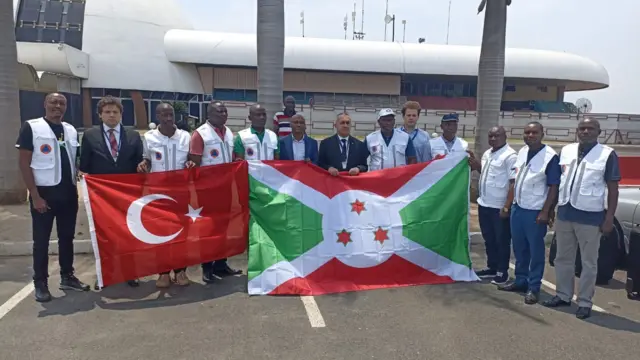 Image source, Burundi Foreign Affair Ministry
Image source, Burundi Foreign Affair MinistryBurundi has deployed a “specialised” team of ten to Turkey to help in the rescue and recovery operations following last week's devastating earthquake.
“[They] will be deployed by Turkish authorities to areas where they need them most”, Burundi Foreign Affair Minister Albert Shingiro told the BBC's Great Lakes on Sunday.
More than 28,000 people have died in Turkey and in neighbouring Syria where the earthquake hit.
A Burundian citizen who was in the hardest-hit city of Gaziantep was evacuated to the capital Ankara, Mr Shingiro said.
Burundi did not deploy a team to Syria because “access to affected areas is difficult," but the minister added that "we sympathise with the suffering brotherly people of Syria."
Namibia no longer prosecutes women who abandon their babies but not everyone is aware of the new law.
Read MorePolice say Kiernan Forbes and Tebello Motsoane were killed at close range in the city of Durban.
Read MoreIt took a university student in Ethiopia four years to get a horrific online photo removed.
Read MoreFor World Radio Day, we celebrate four vibrant community radio stations on four continents. Northern Malawi’s Rumphi FM supports the Tumbuka tribe while giving young women a space to speak out against early marriage and for education. From Budapest, Radio Dikh broadcasts “about the Roma, but not just for the Roma,” presenting Romany culture in its own distinctive voice. In Nunavik, Northern Quebec, Inuit radio beams Inuktitut music and talk to 14 remote villages, helping to keep an ancient language and threatened tradition alive. And in Myanmar, brave journalists risk their lives to resist the military dictatorship with news and views sent out from portable transmitters, sometimes under fire.
The partner of the Ghanaian footballer Christian Atsu says that she still has hop he will be found following the earthquake in Turkey.
Read MoreChristian Atsu's partner calls for help to aid rescue and says confusing reports of his whereabouts have been "shocking".
Read MoreWe'll be back on Monday
That's all for now from the BBC Africa Live team, but we'll be back on Monday morning Nairobi time at bbc.com/africalive.
Until then you can find the latest updates on the BBC News website, or listen to our Africa Today podcast.
A reminder of Friday's wise words:
Quote MessageA bird does not pray for long feathers but for a long life, because as long as it is living its feathers will grow."
A Liberian proverb sent by Gbelly Arrington Johnson in Minneapolis, the US
Click here to send us your African proverbs.
And we leave you with this photo taken in Johannesburg - it's one of our favourites of the last week:
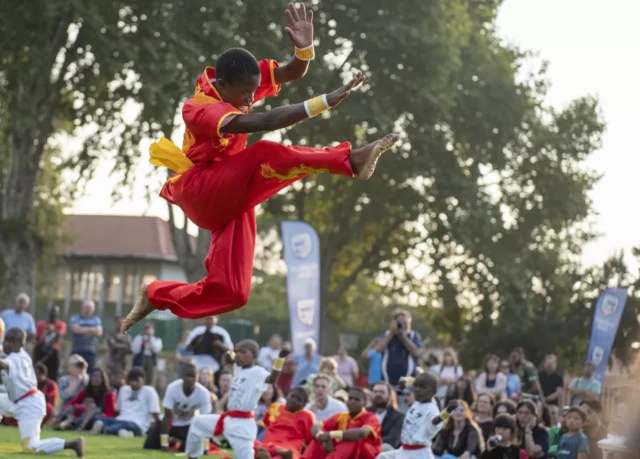 Image source, Getty Images
Image source, Getty ImagesNkechi Ogbonna
West Africa Business Journalist, BBC News
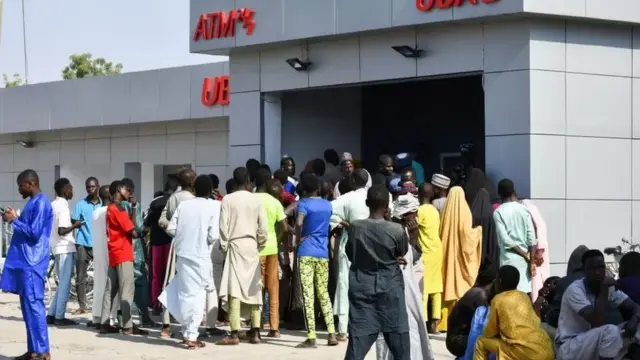 Image source, Getty Images
Image source, Getty ImagesThe redesign has caused chaos in Nigeria, with people unable to withdraw money
Senior Nigerian political figures have asked President Muhammadu Buhari to order the Central Bank to print more new naira notes or allow the new and old banknotes to run simultaneously, to ease the cash scarcity.
That request came from the council of state - a body comprised of top government officials, former presidents and heads of state.
Nigera's Supreme Court suspended the government’s deadline of Friday to stop using old notes, but the country’s Attorney General appealed and the case is set to continue on 15 February.
In November, Nigeria’s Central Bank redesigned the 200, 500, and 1,000 naira banknotes aimed at curbing soaring inflation, cash hoarding and counterfeiting.
However, the limited supply of the new banknotes has meant that Nigerians have had difficulties accessing cash at commercial banks and ATMs which has caused mob attacks in some banks and protests in parts of the country.
Related stories:
Missing Ghanaian footballer Christian Atsu who plays for a club in Turkey has not yet been found since the country was hit by an earthquake, but his partner is holding out hope that he is safe. Earlier in the week there were reports that he had been found, but this was later contradicted.
"I still pray and believe he's alive," Atsu's partner Claire Rupio tells the BBC. She adds:
Quote MessageAll I can say is that, for me, I know that the rescuers are trying their best – and I just feel for everybody, those who like me and my children who are in the unknown, not knowing if their family is alive or not.
Quote MessageAnd I just appeal for the club and the Turkish authorities and the British government to send out the equipment to get the people out that are still trapped in the rubble… they need the equipment – they can’t get that deep without the equipment."
On Wednesday Atsu's agent confirmed that the footballer's whereabouts were unknown, a day after it was reported that had been pulled from the rubble of a building "with injuries".
Since the earthquakes struck on Monday morning, more than 22,000 people in southern Turkey and northern Syria are now known to have died.
Watch Claire Rupio on the BBC here:
Allow X content?
This article contains content provided by X. We ask for your permission before anything is loaded, as they may be using cookies and other technologies. You may want to read X’s cookie policy, external and privacy policy, external before accepting. To view this content choose ‘accept and continue’.
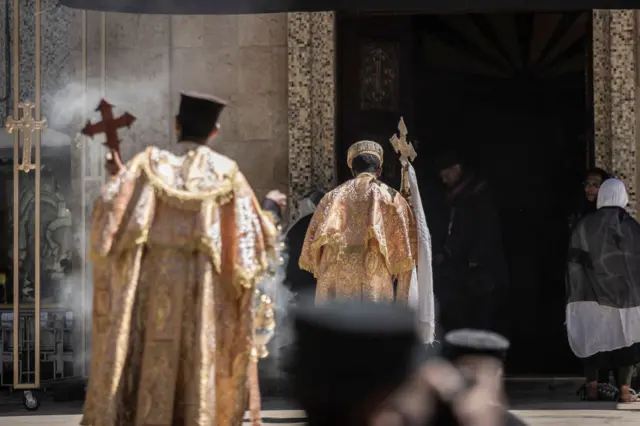 Image source, AFP
Image source, AFPLast month's split in the church - over what language services are held in - has caused deadly violence
A court in the Ethiopian capital, Addis Ababa, has placed an injunction order against breakaway clergy - banning them from entering churches after the main Christian Orthodox Church filed a petition.
The restrictions also include more than 20 bishops appointed by the splinter clergy, the federal police and local police in Oromia region, where clashes have been reported.
Meanwhile the government-affiliated rights watchdog Ethiopian Human Rights Commission (EHRC) accused security forces of using excessive force against followers of the main Church.
The commission said on Friday eight people were killed in Shashemene town in Oromia, but warned the number could increase as its investigations continue.
As of Friday Morocco no longer has an ambassador to France, as no successor was appointed to replace Mohamed Benchaaboun whose departure was announced last month by the North African nation.
Morocco has not stated why it took this step but many suspect it was in backlash to a European Parliament resolution voted on the same day, calling on the Moroccan authorities to respect press freedoms.
Some in Morocco have accused France of having orchestrated an anti-Moroccan campaign at the European Union.
Mr Benchaaboun is a respected diplomat who commentators say had a particularly tough job given the poor state of relations between the two nations.
Allow X content?
This article contains content provided by X. We ask for your permission before anything is loaded, as they may be using cookies and other technologies. You may want to read X’s cookie policy, external and privacy policy, external before accepting. To view this content choose ‘accept and continue’.
Abdijaliil Osman
BBC News
Somalia has reopened its embassy in the UK after 32 years, in a ceremony attended by ambassador Abdulkadir Ahmed Kheyr, Olympic champion Mo Farah and Somali-Canadian model Sabrina Dhowre, among others.
Allow X content?
This article contains content provided by X. We ask for your permission before anything is loaded, as they may be using cookies and other technologies. You may want to read X’s cookie policy, external and privacy policy, external before accepting. To view this content choose ‘accept and continue’.
The embassy in London is expected to provide consular services to the nearly 500,000-strong diaspora community in the UK who are eligible for Somali citizenship, and other services including travel documentation and marriage certificates.
It will also host cultural and other informative events.
Ambassador Kheyr said that reopening the embassy was a positive step in strengthening UK-Somali relations.
The Somali embassy in London was officially closed in 1991 following the collapse of the central government. However, diplomatic relations have strengthened in recent years.
Britain reopened its embassy in Mogadishu in 2013 after a 22-year absence.
Guy Bandolo
BBC News
The transitional president of Chad, Gen Mahamat Déby, and Central African Republic leader Faustin Touadéra have promised to work closely to tackle security issues between their countries.
Recently Chad and the CAR had traded blame over the presence of rebels along their common border, with Bangui accusing N'Djamena of arming and training armed groups who have threatened to oust President Touadéra's government.
But on Thursday both leaders met for two hours behind closed doors, hosted by the Angolan president in Luanda.
According to the Chadian presidency's statement, Chad provides hospitality to Central African opposition leaders for "humanitarian purposes".
The former president of the Central African Republic, François Bozizé, lives in Chad's capital city N'Djamena. He is the head of the main rebel coalition in CAR.
However the Chadian authorities gave assurances of their willingness to collaborate for security in the CAR.
Ahead of the 2023 elections, Nigeria is facing issues ranging from insecurity, unemployment and a stalling economy.
Read More Image source, iStock
Image source, iStockThe strikes started two days ago (stock image)
Public hospital staff in the Central African Republic say they will carry on striking until their demands - for better working conditions, overdue Covid-19 bonuses, and the integration of temporary staff - are met.
"We've been striking since Wednesday and nothing has been won yet," says Sandrine Biani of the Independent Health Workers' Union.
A minimum service level is in place but the strikes are having a severe impact on the care patients receive, according to French news site RFI, external.
Health Minister Pierre Somsé says the Central African Republic is "sparing no effort to improve health professionals' working conditions". He has asked medics to "trust the government", and urged the public to keep its faith in the health service.
Other branches of early humans, not just ancestors of Homo Sapiens, used them to cut and crush food.
Read More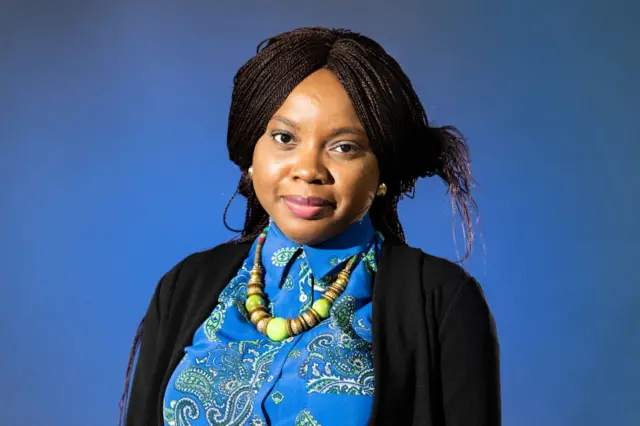 Image source, Getty Images
Image source, Getty ImagesAuthor Ayòbámi Adébáyò says citizens are fed up of being sold short
A new novel by award-winning Nigerian novelist Ayòbámi Adébáyò offers a vision of what is at stake as Nigerians head to the polls in about a fortnight.
Tensions are already high in the country, as almost 100 million Nigerians prepare to choose their next president, as well as hundreds of other elected officials.
Adébáyò's book, A Spell of Good Things, takes a close look at politics in Nigeria through the eyes of a teenage boy from a poor family and a young female doctor from a rich family.
It draws parallels with politicians in the country, who the author says don't emerge with much credit.
"That is reflected in what is happening right now. People literally cannot get cash out of the bank even though they have money in the bank... what many people have resorted to is having to buy money, it's ridiculous," she told BBC Newsday.
The book starts with a tailor rejecting campaign offerings from a politician.
Quote MessageIt's a trade... people get these things and then they don't have good roads, they don't have hospitals, they don't have good education and the politicians - once they get in - feel like they've paid you for the next four years.
Quote MessageThat's what she's rejecting at the beginning of the book. She would rather have somebody in government who is ready to do something she's interested in."
Adébáyò also says the novel explores the reality of living in a space where there is "no real political commitment to development", and the effect that has on people.